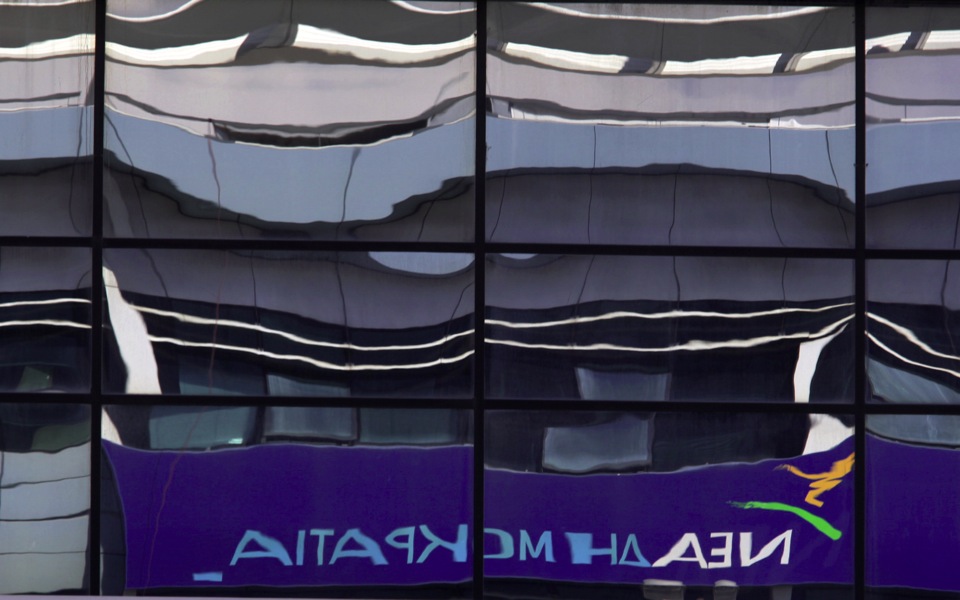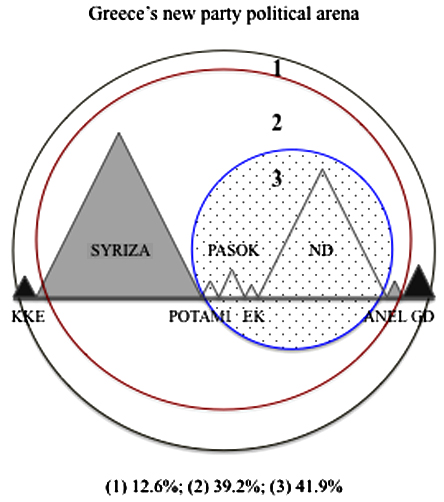Greece’s embattled opposition

It was the third public vote this year in Greece and, once again, not only did left-wing SYRIZA win big, but its victory was a most extraordinary one. Defying every prognostication, this party retained its previous electoral percentage despite a major internal split and a disastrous record in government, during which banks were closed, capital controls were imposed, Greece’s position in the euro was put at serious risk, and the country accepted a third bailout under onerous conditions. In no time, and with no second thoughts, SYRIZA formed a new government with its former coalition partner, the populist right-wing Independent Greeks (ANEL) party, and in tandem they set out to consolidate their populist hegemony in Greece.
Now, flip the coin, and what you see is Greece’s badly beaten liberal, pro-market and pro-EU opposition parties, that is, those political forces standing against both the nondemocratic extremists on left and right (the Communist Party and neo-Nazi Golden Dawn), as well as the left-plus-right populist coalition currently in office. As is seen in the following illustration, the liberal camp extends from the center-left Potami and PASOK to the Union of Centrists (EK) to the center-right New Democracy (ND). Put together, in the last national election these parties received almost 42 percent of the votes cast, compared to a total of 39.2 percent for the populist coalition government parties and 12.6 percent for the nondemocratic and anti-EU faraway parties on both left and right.

As things stand, the liberal pro-European parties are faced, individually as well as collectively, with three hazards – identity crisis, fragmentation and asphyxiation. The first, identity crisis, is caused by poor electoral results (Potami), strategic confusion (PASOK), total lack of strategy (EK), and internal divisions (ND). Fragmentation, secondly, is evident in a confined political and ideological space that contains no less than four parties. That asphyxiation, thirdly, presents a real danger comes from the fact that, as depicted in the illustration above, the liberal opposition is encircled by the populist SYRIZA-ANEL coalition, and thus left with very little room for maneuver.
For Greece’s parties standing in liberal and undeservedly pro-European opposition to a populist government, there are only two options available – either try to survive individually or unite as a single political camp to defend political and economic liberalism. The first option is certain to be detrimental for all parties in opposition, as in that case they will remain small and fragmented, and will reward the government. PASOK, its old populist clothes now stolen by SYRIZA, gives the impression of a historical relic and seems unable to modernize. Potami has failed to present itself as a real mass and organized party, which makes its survival uncertain, while EK is most certainly a flash party. As for ND, it may as well implode because of the many factions and antagonisms that have developed inside it.
Is the amalgamation of all these parties feasible so they can form a common liberal and fully EU-committed camp? At least theoretically, and, at first sight, paradoxically, this is not an entirely unlikely possibility. For one thing, Potami and PASOK share quite similar ideas and policy positions, which are not necessarily opposed by ND; each and all of these parties can field excellent cadres, which comes into sharp contrast with the unattractiveness of their respective, often vainglorious, leaders. For another thing, PASOK and ND, past differences largely forgotten, have already governed together, under political strain and yet with considerable unanimity and not negligible results; there is real political capital formed between the two parties, which is to be used in the future. Finally, and perhaps most importantly, ND, the biggest of the opposition parties – and one that displays more pragmatism than ideological clarity – cannot topple the populist coalition by itself; it is instead required that it moves toward the center and collaborate with all possible allies that are available to reconstitute a solid liberal camp.
At the moment, ND has too many candidates for the party leadership but only one real choice: to do whatever it takes to give the country a potent liberal center. As clearly shown in the illustration above, the crossing to the right is altogether blocked. At least as long as it remains in power as junior coalition partner, ANEL is unlikely to suffer significant voter loss; instead, it could try eating into ND’s more conservative and nationalistic flanks. It would also be folly if ND attempted to penetrate Golden Dawn; this party seems to have consolidated its disturbing presence on the far-right of the political spectrum, and any move indicating rapprochement is certain to cost ND significant losses of moderate and liberal voters.
It is therefore patently clear that ND has to take the initiative and move decisively toward the liberal center, also deliberatively seeking to merge with the other center and center-left forces. That is the only way open to it. And that is also the surest way to offer an attractive alternative to the people who increasingly prefer to abstain from elections due to their distaste for populism, their disenchantment with liberalism, or both together. Any other choice will simply – and most surely – intensify the liberal parties’ problems of identity, fragmentation and existence. It will also be a stroke of luck for Greece’s currently hegemonic populist coalition.
Takis S. Pappas has recently authored "Populism and Crisis Politics in Greece" (Macmillan 2014) and co-edited "European Populism in the Shadow of the Great Recession" (ECPR Press 2015). An aficionado of Greek politics, he currently lives in Strasbourg, France, working on a new book project under the title "Democratic Illiberalism: How Populism Grows."





